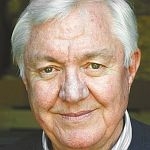 (Host) The possibility of an Israeli attack on Iran’s nuclear program weighs heavily on the price of gasoline, the world economic recovery and the outcome of the 2012 American presidential election. Commentator and retired ABC News diplomatic correspondent Barrie Dunsmore examines the growing opposition to an attack on Iran – in Israel.
(Host) The possibility of an Israeli attack on Iran’s nuclear program weighs heavily on the price of gasoline, the world economic recovery and the outcome of the 2012 American presidential election. Commentator and retired ABC News diplomatic correspondent Barrie Dunsmore examines the growing opposition to an attack on Iran – in Israel.
(Dunsmore) The major Republican presidential candidates – and substantial majorities in both the U.S. House and Senate – appear untroubled by the prospects of war with Iran to prevent it from becoming a nuclear power. They seemingly accept, without question, Israeli Prime Minister Benjamin Netanyahu’s claim that Iran’s nuclear capabilities are an existential threat to Israel which must be stopped – and soon.
But the imminence of that threat is now being fiercely debated in Israel itself. Just this past week, current and recent Israeli military and security chiefs have publicly expressed views which directly contradict Netanyahu’s analysis.
In a rare interview, the Chief of Staff of the Israeli Defense Forces, Lieutenant General Benny Gantz, made clear that it was his job to make the Israeli military threat to attack Iran credible. But when it came to Netanyahu’s claim that Iran is led by religious extremists who cannot be deterred because they are suicidal, General Gantz pointedly disagreed. He said he thought Iran’s leaders were rational, that they had not yet decided to actually produce a nuclear weapon, and that the tough new sanctions on Iran were working – implying that diplomacy could yet succeed. On those key points, that puts the Israeli chief of staff much closer to President Barack Obama than to his own Prime Minister.
Meir Dagan, the recent head of Israel’s external intelligence agency, Mossad, is continuing his campaign against Netanyahu’s apocalyptic rhetoric on the Iranian threat. Dagan was joined this past week by Yuval Diskin, the recent head of Shin Bet, Israel’s internal security agency. Diskin was highly personal in his attacks on Netanyahu and Defense Minister Ehud Barak concerning their threats against Iran. In the Shin Bet chief’s words, “I have no faith in either the Prime Minister or the Defense Minister. I am very distrustful of a leadership that makes decisions based on messianic senses…. I’ve seen them up close. They are not messiahs.”
Next came Ehud Olmert, a former Israeli Prime Minister who spoke this past week in New York City to an audience evidently supportive of Netanyahu. Olmert was loudly booed numerous times when he challenged Netanyahu’s approach to Iran – and also when he suggested Israel should be less confrontational in its dealings with President Obama. In a later interview with the New York Times, Olmert warned of the danger that, having likened Iran to Nazi Germany, Netanyahu and Ehud Barack may find themselves unable to back down from military action.
In opinion polls, about 60% of Jewish Israelis support an attack on Iran – if led by the United States. But only 40% think Israel should act alone. What these polls clearly indicate – as does Israel’s intense internal debate – is that the people of Israel are giving serious thought to the consequences of war with Iran. And they, along with Israel’s top national security experts, are sharply divided.